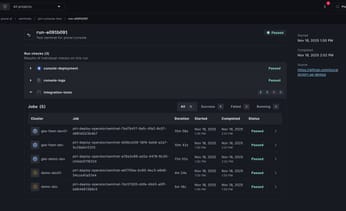
Kubernetes Training: Your Certification Guide
Master Kubernetes with our comprehensive training guide. Explore certification paths, top providers, and strategies to enhance your skills in Kubernetes training.
As Kubernetes becomes the standard for container orchestration, the demand for engineers with proven expertise continues to surge—driving both career advancement and higher earning potential. Earning a Kubernetes certification isn’t just about adding a credential to your résumé; it’s a formal, hands-on demonstration of your ability to manage complex, distributed systems in real-world environments.
Unlike theoretical learning, preparing for a Kubernetes certification forces you to develop practical, applied skills—from configuring clusters and managing workloads to troubleshooting failures under pressure. It builds the kind of operational confidence that modern DevOps and platform engineering roles demand.
This guide walks you through the Kubernetes certification landscape, covering the most recognized exams, leading training providers, and the strategies that will help you study efficiently and pass with confidence. Whether you’re looking to get certified as an administrator, developer, or security specialist, this resource will help you choose the right path and master the skills employers are actively looking for.
Unified Cloud Orchestration for Kubernetes
Manage Kubernetes at scale through a single, enterprise-ready platform.
Key takeaways:
- Go beyond commands to concepts: Effective training teaches the "why" behind Kubernetes architecture, not just the "how" of
kubectl. This deep understanding is essential for troubleshooting complex issues and maximizing the value of management platforms like Plural that automate underlying operations. - Align training with your role and goals: Select a training path based on your specific responsibilities—administration (CKA), development (CKAD), or security (CKS). This targeted approach ensures you acquire the most relevant skills for your day-to-day work and career progression.
- Prioritize practical, hands-on learning: The most valuable training programs emphasize hands-on labs that simulate real-world production scenarios. This practical experience is what builds the confidence and competence needed to manage and debug live systems, moving you from theoretical knowledge to operational readiness.
Why Invest in Kubernetes Training?
Kubernetes has become the de facto standard for container orchestration, but its flexibility and power come with steep complexity. Relying on ad-hoc learning or trial-and-error—especially in production—can quickly lead to misconfigurations, downtime, and serious security risks. Formal training equips engineers with both the theoretical foundation and practical skills to operate clusters reliably and securely, transforming Kubernetes from a daunting tool into a strategic advantage.
The demand for Kubernetes professionals remains exceptionally high, reflecting its central role in modern cloud-native infrastructure. For engineers, this opens up significant career growth and earning potential. For organizations, investing in training reduces operational risk by enabling faster troubleshooting, stronger system resilience, and a broader base of Kubernetes fluency, so you’re not dependent on a handful of senior experts.
A deep understanding of core concepts—like control plane internals, pod scheduling, and CNI networking—is also essential when working with a unified management platform like Plural. Engineers who understand what’s happening under the hood can better trust and leverage the automation Plural provides through its GitOps-driven, single-pane-of-glass interface.
Structured Kubernetes training provides a clear progression—from foundational knowledge to advanced specializations like security and observability. Whether your goal is certification or simply improving daily operations, top courses from trusted providers like the Linux Foundation and Udemy emphasize real-world application.
The Cloud Native Computing Foundation (CNCF), which maintains Kubernetes, offers three official certifications:
- Certified Kubernetes Administrator (CKA) — for cluster management and operations
- Certified Kubernetes Application Developer (CKAD) — for developers building apps on Kubernetes
- Certified Kubernetes Security Specialist (CKS) — for security-focused cluster operations
By investing in training, you build a common language and a consistent skill set across your team, which is foundational to scaling your Kubernetes practice safely and efficiently.
Top Kubernetes Training Providers
Choosing the right training provider is a critical step in mastering Kubernetes. The landscape offers diverse learning styles—from formal certification programs to hands-on lab environments—so your selection should align with your goals, team size, and preferred learning method. Below is a breakdown of the top providers and how they help different kinds of learners succeed.
The Linux Foundation
As the home of the CNCF and Kubernetes itself, the Linux Foundation is the official source for Kubernetes certifications and training. Their courses are designed by Kubernetes maintainers and directly prepare you for certifications like:
- CKA (Certified Kubernetes Administrator)
- CKAD (Certified Kubernetes Application Developer)
- CKS (Certified Kubernetes Security Specialist)
This is the most authoritative path for formal certification and industry-recognized credentials.
Cloud Native Computing Foundation (CNCF)
While CNCF partners with the Linux Foundation for certifications, its primary focus is community engagement and ecosystem best practices. CNCF offers:
Use CNCF as a hub for understanding real-world Kubernetes use cases and emerging trends in cloud-native infrastructure.
Pluralsight
Pluralsight offers a subscription-based platform with a vast library of Kubernetes courses, from beginner to advanced. Key features include:
- Skill assessments
- Hands-on learning paths
- Cross-domain topics (e.g., Kubernetes + DevSecOps or Python)
Ideal for teams who want ongoing access to content across DevOps, cloud, and programming.
KodeKloud
KodeKloud is renowned for its interactive, lab-based training, with real Kubernetes environments running in your browser. Their learning paths include:
- CKA Learning Path
- CKAD Learning Path
- Live-terminal exercises to build hands-on skill
Best for engineers preparing for performance-based exams or those who learn best by doing.
Coursera
Coursera partners with top universities and cloud vendors to deliver structured, academic-style learning. Popular Kubernetes courses include:
- “Architecting with Kubernetes” by Google Cloud
- “Introduction to Containers w/ Docker, Kubernetes & OpenShift” by IBM
A good option for learners who want peer-reviewed assignments and verified certificates from institutions.
Udemy
Udemy offers a wide range of affordable, à la carte Kubernetes courses from independent instructors. Examples include:
Ideal for budget-conscious, self-driven learners who want to pick specific skills or topics without a subscription commitment.
A Cloud Guru
Now part of Pluralsight, A Cloud Guru focuses on Kubernetes in cloud environments like EKS, GKE, and AKS. Features include:
- Cloud sandboxes and playgrounds
- Real-world cloud-native workflows
- Courses tailored to specific cloud providers
A top choice if your work revolves around Kubernetes on AWS, Azure, or GCP.
Plural
Unlike traditional training providers, Plural is a Kubernetes platform that enables applied learning. Teams get direct exposure to:
- GitOps-based deployment automation
- Role-based access and self-service infrastructure
- Real-world fleet management challenges
This makes Plural ideal for platform engineers who want to move beyond certification and manage production-grade clusters with modern tooling.
How to Compare Training Programs
Not all Kubernetes training programs are created equal. When evaluating options for your team, focus on a few key areas to ensure the investment aligns with your technical and operational goals. A thorough comparison will help you select a program that delivers practical skills your engineers can apply directly to managing your infrastructure. Here’s a breakdown of what to look for.
Content and Specializations
When evaluating programs, start with the curriculum. A solid foundational course should cover core Kubernetes architecture, objects like Pods and Deployments, networking, and storage. For experienced engineers, look for specializations in areas like security, application development, or specific cloud provider implementations. The Linux Foundation offers a spectrum of Kubernetes training that scales from fundamental concepts to advanced topics. This ensures you can find a path that addresses your team's specific skill gaps and project requirements. The official Kubernetes training page is also a useful resource for surveying the types of programs available across the ecosystem.
Learning Formats
Training programs are typically offered in three formats: in-person, live online, and self-paced. In-person training provides direct interaction with instructors but requires travel and a fixed schedule. Live online courses replicate the classroom experience remotely, offering structure and real-time Q&A. Self-paced learning offers the most flexibility, allowing engineers to fit training around their work schedules. Each format has its trade-offs, so the right choice depends on your team’s learning preferences, availability, and budget.
Time Commitment
Before committing, get a clear estimate of the time required. This includes not just lecture hours but also time for labs, reading, and studying for exams. For example, the Kubernetes Fundamentals course from the Linux Foundation includes about 35 hours of material. Also, check the access period—many self-paced courses provide access for 6 to 12 months. This allows engineers to learn at a sustainable pace without disrupting critical projects. A realistic understanding of the time commitment helps with planning and ensures a higher completion rate for your team.
Hands-on Labs
Theoretical knowledge of Kubernetes is not enough; practical skills are essential. The best training programs integrate hands-on labs that allow you to work directly with a cluster. These labs should cover common operational tasks like deploying applications with Deployments, exposing them with Services, managing configuration with ConfigMaps, and implementing basic security policies. This practical experience is what enables engineers to effectively troubleshoot and manage production environments. It builds the muscle memory needed to confidently manage complex deployments, whether manually or through a GitOps platform like Plural.
Pricing and Value
While price is a factor, focus on the overall value. A program’s cost should be weighed against what it includes, such as quality of materials, access to lab environments, instructor support, and exam vouchers. For instance, some providers offer bundles that package a course with a certification exam attempt at a reduced price. The real value, however, comes from the skills your team acquires. Effective training translates directly to improved operational efficiency, reduced downtime, and more secure infrastructure, providing a clear return on investment that goes far beyond the initial course fee.
Popular Kubernetes Certification Paths
Kubernetes certifications validate your skills with real, hands-on problem solving in live cluster environments. Each certification targets a different role—whether you're building applications, administering infrastructure, or securing containers. These credentials are recognized globally and provide clear benchmarks for employers and engineering leaders.
Certified Kubernetes Administrator (CKA)
Certified Kubernetes Administrator (CKA) is designed for system administrators, DevOps engineers, and platform teams who manage Kubernetes clusters.
The CKA exam covers:
- Cluster installation and configuration
- Core component management (Pods, Deployments, etc.)
- Networking and service exposure
- Troubleshooting and debugging
- Security basics like RBAC and secrets
CKA-certified professionals understand the inner workings of Kubernetes and can make informed decisions about architecture, making them well-suited to take advantage of platforms like Plural for automating multi-cluster operations.
Exam details:
- Format: Online, proctored, performance-based
- Duration: 2 hours
- Prerequisites: None
- Cost: $395 (includes one retake)
Certified Kubernetes Application Developer (CKAD)
Certified Kubernetes Application Developer (CKAD) is aimed at engineers who build and deploy applications on Kubernetes.
The CKAD focuses on:
- Designing and deploying containerized apps
- Working with core resources like Deployments, Services, ConfigMaps, and Secrets
- Multi-container patterns (sidecars, init containers)
- Probes and logging for observability
- Declarative configuration using YAML
This certification is ideal for developers working in GitOps environments. With platforms like Plural, declarative application definitions written by CKAD-certified engineers can be reliably deployed and managed across multiple clusters.
Exam details:
- Format: Online, proctored, performance-based
- Duration: 2 hours
- Prerequisites: None
- Cost: $395 (includes one retake)
Certified Kubernetes Security Specialist (CKS)
Certified Kubernetes Security Specialist (CKS) is for engineers who already hold the CKA and want to specialize in Kubernetes security.
The CKS exam tests your ability to:
- Harden clusters against attacks
- Secure container images and the software supply chain
- Implement and enforce network policies
- Detect and respond to runtime threats using tools like Falco
- Apply Pod security standards and audit policies
CKS-certified engineers play a key role in establishing cluster security at scale. Platforms like Plural support this by simplifying fleet-wide RBAC, OPA policy enforcement, and secure deployment pipelines.
Exam details:
- Format: Online, proctored, performance-based
- Duration: 2 hours
- Prerequisite: CKA certification
- Cost: $395 (includes one retake)
Vendor-Specific Kubernetes Certifications
Cloud providers like Google Cloud, AWS, and Microsoft offer Kubernetes training and certifications specific to their managed services:
- Google Cloud – Professional Cloud DevOps Engineer (with GKE)
- AWS – EKS-focused training paths
- Microsoft – AKS training and certification
These certifications are valuable if your infrastructure is tied closely to a specific cloud. However, in hybrid or multi-cloud environments, a vendor-neutral control plane like Plural ensures consistent management, regardless of the underlying platform.
What Makes a Good Training Program?
Evaluating a Kubernetes training program requires more than skimming the syllabus. The best programs don’t just teach definitions—they prepare you to solve real-world problems in production environments. A truly valuable course focuses on practical experience, expert instruction, and long-term support, giving you more than just a certificate: it builds your confidence as a Kubernetes practitioner.
While many courses can explain what a Pod or Deployment is, only the best will teach you how to troubleshoot a CrashLoopBackOff error at 3 AM or secure an application under pressure. The difference lies in the program’s structure, instructor expertise, and its commitment to applied learning. To identify the right course for your needs, consider four critical factors: reviews from past students, the background of the instructors, the quality and currency of the materials, and the availability of post-course support.
User Reviews and Success Stories
Feedback from alumni often provides the clearest view into a training program’s effectiveness. Look for detailed reviews on LinkedIn, Reddit, and developer forums. Focus on responses that go beyond generic praise—comments that mention how a course helped someone pass the CKA or handle real production scenarios are far more insightful. A program that consistently produces confident, capable engineers is one that’s worth your investment.
Instructor Expertise and Support
Instructor quality is often the single biggest variable in your learning experience. Look for trainers with real-world Kubernetes experience who can explain both basic and advanced concepts clearly. Equally important is the level of support you receive. Some courses include live sessions, office hours, or expert-moderated discussion boards. These support channels can be critical for working through complex topics like network policies or pod security standards.
Quality of Course Materials
Effective Kubernetes training blends theory with hands-on practice. Look for programs that include labs simulating real-world cluster scenarios: deploying applications, configuring services, managing secrets, and debugging failures. These practical exercises are essential for building muscle memory and understanding how Kubernetes behaves in real environments. Ensure the content is kept up to date with the latest Kubernetes versions—outdated material can mislead learners and reinforce obsolete practices.
Post-Training Support and Community
Kubernetes is a fast-moving ecosystem. Your learning doesn’t end when the course is over. The most valuable training programs offer post-training support through alumni forums, Slack communities, or follow-up webinars. These communities allow you to continue learning, ask questions, and stay updated on new developments. They also create valuable peer connections that can help throughout your career.
Choose Your Kubernetes Training Path
Selecting the right Kubernetes training program is a strategic decision with a direct impact on your career growth. With countless certifications, learning platforms, and content formats available, the process can feel overwhelming. The key is to approach it methodically: tailor your path to your current experience, long-term goals, and practical constraints.
Rather than simply browsing popular courses or chasing certifications, take the time to define a targeted learning strategy. This starts with an honest assessment of your skills and ends with a clear plan for achieving a credential that aligns with your aspirations. Below are four key steps to help you move from exploration to action.
Assess Your Current Skills
Start with a realistic evaluation of your current knowledge. If you're new to Kubernetes or container orchestration in general, a foundational overview—such as a free introductory course—can help you get oriented without overcommitting.
A useful benchmark for entry-level readiness is the curriculum of the Kubernetes and Cloud Native Associate (KCNA) exam. Use it as a checklist to understand which areas you’re already comfortable with and where you need to focus. This prevents you from paying for content you’ve already mastered and ensures you start your journey at the right level.
Define Your Career Goals
Your training should reflect where you want to go, not just where you are now. Kubernetes certifications map closely to different career paths:
- CKA (Certified Kubernetes Administrator) is ideal for infrastructure engineers or DevOps roles responsible for managing clusters.
- CKAD (Certified Kubernetes Application Developer) is best suited for developers deploying and maintaining applications within Kubernetes.
- CKS (Certified Kubernetes Security Specialist) is focused on securing Kubernetes environments and is recommended for platform security roles, but it requires CKA as a prerequisite.
Choosing a certification based on your professional goals ensures you’re acquiring relevant, high-impact skills rather than simply collecting badges.
Select the Right Course Level
Once you've identified your starting point and your destination, choose a course that bridges that gap. Beginners should look for programs that build a solid base—such as the Kubernetes Fundamentals (LFS258) course from The Linux Foundation, which is designed to prepare learners for the CKA.
If you’re already familiar with core concepts, consider advanced or domain-specific courses, such as those focusing on observability, policy enforcement with OPA, or managing Kubernetes on a specific cloud provider. Look for structured learning paths that provide a smooth, logical progression from intermediate to expert.
Factor in Your Time and Budget
Training programs vary widely in both cost and time commitment. While there are excellent free and low-cost options, more comprehensive offerings often include hands-on labs, practice exams, and bundled certification vouchers that can offer better long-term value.
Consider your availability as well. Self-paced courses provide flexibility, while live or instructor-led formats may offer more accountability and support. Be realistic about how many hours per week you can dedicate—especially if you’re balancing training with full-time work. Completing a full learning path or preparing for an exam like the CKA could take anywhere from a few weeks to several months.
The Career Impact of a Kubernetes Certification
A Kubernetes certification is more than a line item on a resume; it’s a formal validation of your ability to manage complex, distributed systems. As organizations increasingly standardize on Kubernetes for container orchestration, the demand for engineers with proven expertise has grown substantially. This isn't just about knowing the right kubectl commands. It's about understanding the underlying architecture, from the control plane components to the networking model, and being able to apply that knowledge to solve real-world problems.
This deep, practical understanding is precisely what certification exams test for. The preparation process requires you to move beyond theory and engage in hands-on practice, building the muscle memory needed to configure, manage, and troubleshoot clusters effectively. For engineers working with sophisticated management platforms, this foundational knowledge is critical. For instance, to fully leverage a tool like Plural for fleet management, you need to understand the GitOps principles and Kubernetes resources it orchestrates. A certification demonstrates you have that baseline competence, making you a more effective engineer and a more attractive candidate for high-impact roles. It signals to employers that you are equipped to handle the responsibilities of maintaining production-grade infrastructure.
Job Market Demand
Kubernetes skills are in high demand across the tech industry. A quick review of any major job board shows a large volume of open roles for DevOps engineers, platform engineers, and SREs that list Kubernetes as a core requirement. As companies migrate legacy applications and build new cloud-native services, they need professionals who can manage containerized workloads at scale. A certification provides verifiable proof of your skills, helping your profile stand out in a competitive market. It confirms you have the hands-on experience to manage deployments, configure networking, and maintain cluster health. This is especially valuable for organizations that rely on consistent, automated workflows to manage their infrastructure, which is where a platform like Plural's continuous deployment solution becomes essential.
Salary Potential
The high demand for Kubernetes expertise directly translates to significant earning potential. According to Coursera, the average salary for a Kubernetes professional is around $147,000 per year, though this can vary based on experience, location, and the specific role. This figure reflects the critical role these engineers play in an organization. They are responsible for the reliability and scalability of core business applications, and their work has a direct impact on performance and revenue. An engineer proficient in Kubernetes can help reduce infrastructure costs, minimize downtime, and accelerate feature delivery. The skills validated by a certification are the foundation for mastering these high-value tasks, making it a worthwhile financial investment for your career.
Career Progression Opportunities
Investing in Kubernetes training and certification opens a clear path for career advancement. The CNCF offers a tiered certification system, allowing you to progress from foundational knowledge to specialized expertise. You might start with the Certified Kubernetes Administrator (CKA) to build a strong operational base, then pursue the Certified Kubernetes Application Developer (CKAD) or the Certified Kubernetes Security Specialist (CKS) to specialize further. This structured progression can lead to senior roles like Platform Architect or Lead SRE. In these positions, you’ll move from day-to-day cluster management to making strategic decisions about tooling and architecture, such as implementing a unified Kubernetes dashboard to provide secure, observable access across the entire organization.
How to Succeed in Your Kubernetes Training
Successfully learning Kubernetes requires more than just enrolling in a course; it demands a strategic approach to studying and a commitment to hands-on practice. By building a solid foundation and using the right resources, you can navigate the complexities of the ecosystem and turn theoretical knowledge into practical expertise. The following steps will help you structure your learning process for the best results.
Technical Prerequisites
Before diving into Kubernetes, ensure you have a firm grasp of the underlying technologies. A strong foundation will make abstract Kubernetes concepts much easier to understand. Most high-quality training programs assume you have practical experience with the Linux command line, including file system navigation and package management. You should also be comfortable with containerization principles, primarily using Docker to build and manage images. Familiarity with version control using Git is essential, as modern infrastructure is managed through code. Finally, a basic understanding of networking concepts like IP addressing, ports, and DNS will provide the context needed to tackle Kubernetes networking.
Effective Study Strategies
Passive learning won't be enough to master Kubernetes. The most effective strategy is to engage directly with the material through consistent, hands-on practice. Break down complex topics like the control plane architecture or service discovery into smaller, digestible modules. For each module, set a clear goal, such as deploying a specific type of application or configuring a network policy. Dedicate regular, focused time to studying rather than cramming. This approach reinforces concepts and builds muscle memory. Actively seek to understand why a particular component works the way it does, not just how to configure it. This deeper comprehension is what separates a novice from an expert.
Supplementary Tools and Resources
Your primary training course is just the start. To solidify your skills, you need to experiment in a safe environment. Set up a local Kubernetes cluster using tools like Minikube or KIND to deploy applications and break things without consequence. The official Kubernetes documentation should be your go-to reference for authoritative information. To see how these concepts apply in a production-like setting, you can explore the Plural open-source marketplace. Deploying real-world applications like Airflow or Dagster allows you to inspect the underlying Kubernetes manifests and observe how a complete system is assembled, bridging the gap between simple exercises and complex, real-world deployments.
Overcome Common Challenges
Kubernetes has a notoriously steep learning curve, and it’s normal to hit roadblocks. Common challenges often arise from its many layers of abstraction, complex networking, and verbose YAML configurations. When you feel stuck, try to visualize the problem. For networking issues, draw out the traffic flow from an external request down to a specific pod. For configuration problems, start with the simplest possible manifest and add complexity one step at a time. Using a platform like Plural can also help by demonstrating best practices in a real environment. Its GitOps-based automation handles the intricate details of deployment, allowing you to see how a well-architected system operates and learn from its patterns.
Related Articles
- Kubernetes: Is it Worth the Investment for Your Organization?
- Automated Kubernetes Management: A Comprehensive Guide
- Managed Kubernetes Clusters: Everything You Need to Know
- What is Kubernetes Used For? Explained Simply
- Kubernetes Orchestration: A Comprehensive Guide
Unified Cloud Orchestration for Kubernetes
Manage Kubernetes at scale through a single, enterprise-ready platform.
Frequently Asked Questions
Is a Kubernetes certification worth it if I already have hands-on experience? Yes, it is. While on-the-job experience is invaluable, a certification like the CKA or CKAD validates your skills against a formal, industry-wide standard. The process of preparing for an exam forces you to learn the parts of Kubernetes you might not encounter in your day-to-day work, filling in critical knowledge gaps. It demonstrates a commitment to your craft and provides a clear benchmark of your expertise, which is highly valued by employers.
Which certification should I get first, the CKA or the CKAD? This depends entirely on your role and career goals. If you are responsible for building, managing, and troubleshooting the Kubernetes clusters themselves, start with the Certified Kubernetes Administrator (CKA). If your primary focus is on designing, building, and deploying applications that run on top of Kubernetes, the Certified Kubernetes Application Developer (CKAD) is the more relevant path. Think of it this way: the CKA is for the platform team, while the CKAD is for the application developers using the platform.
How does formal training help my team if we use a platform like Plural that automates Kubernetes management? Automation platforms like Plural are most effective when the teams using them understand the underlying technology. Plural streamlines fleet management by automating GitOps workflows and providing a single-pane-of-glass console, but it doesn't replace the need for expertise. A well-trained team can better troubleshoot issues when they arise, customize IaC templates for specific needs, and correctly interpret the observability data Plural provides. Training empowers your engineers to use the platform to its full potential, turning automation from a convenience into a strategic advantage.
What are the most important prerequisites for starting Kubernetes training? To get the most out of any Kubernetes training program, you should have a solid foundation in a few key areas. You need to be comfortable working on the Linux command line and have a practical understanding of containerization concepts, preferably with hands-on Docker experience. A basic grasp of networking fundamentals like IP addresses, ports, and DNS is also essential. These prerequisites ensure you can focus on learning Kubernetes itself, rather than getting stuck on the foundational technologies it builds upon.
With so many training options, what's the single most important factor to look for in a program? The single most important factor is the quality and depth of its hands-on labs. Theoretical knowledge of Kubernetes is not enough to prepare you for managing a production environment. The best programs immerse you in realistic, scenario-based labs where you can deploy applications, troubleshoot common failures, and configure security policies in a live command-line environment. This practical experience is what builds the confidence and muscle memory required to manage complex systems effectively.
Newsletter
Join the newsletter to receive the latest updates in your inbox.









